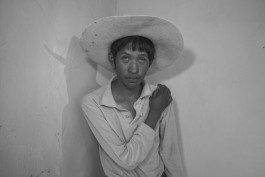Exhibition:
'Scavando si impara. La lezione peruviana'
Paccarik Orue, Alessandro Cinque, and Thomas Locke Hobbs
February, 2022
Peru is among the countries hardest hit by the Covid-19 pandemic. At the end of January 2022, tens of thousands of miners protested in the streets to denounce working conditions that violate human dignity and to ask for a minimum guarantee of health safety. This situation further aggravates the quality of life in mining regions already compromised by disconcerting pollution thresholds. The greedy race for profits of the large multinationals to grab the underground resources on the skin of workers and families, whose precariousness leaves little other hope, brings us back to consider the dramatic impact of neo-colonialism in Latin America. A sense of ineluctability that can justify the thesis of Gilles Dauvé, "capitalism will never be ecological." From this point of view, the South American country seems to represent a borderline which, however, magnifies issues of planetary interest, which concern everyone, in short, and with all due respect to publicity in green sauce. As we dig into the reasons for exploitation, ecological abomination, and social inequalities, we can unmask the threads that intertwine the puppeteers. Here is the Peruvian lesson.



Exhibition:
'Scavando si impara. La lezione peruviana'
Paccarik Orue, Alessandro Cinque, and Thomas Locke Hobbs
February, 2022
Peru is among the countries hardest hit by the Covid-19 pandemic. At the end of January 2022, tens of thousands of miners protested in the streets to denounce working conditions that violate human dignity and to ask for a minimum guarantee of health safety. This situation further aggravates the quality of life in mining regions already compromised by disconcerting pollution thresholds. The greedy race for profits of the large multinationals to grab the underground resources on the skin of workers and families, whose precariousness leaves little other hope, brings us back to consider the dramatic impact of neo-colonialism in Latin America. A sense of ineluctability that can justify the thesis of Gilles Dauvé, "capitalism will never be ecological." From this point of view, the South American country seems to represent a borderline which, however, magnifies issues of planetary interest, which concern everyone, in short, and with all due respect to publicity in green sauce. As we dig into the reasons for exploitation, ecological abomination, and social inequalities, we can unmask the threads that intertwine the puppeteers. Here is the Peruvian lesson.



